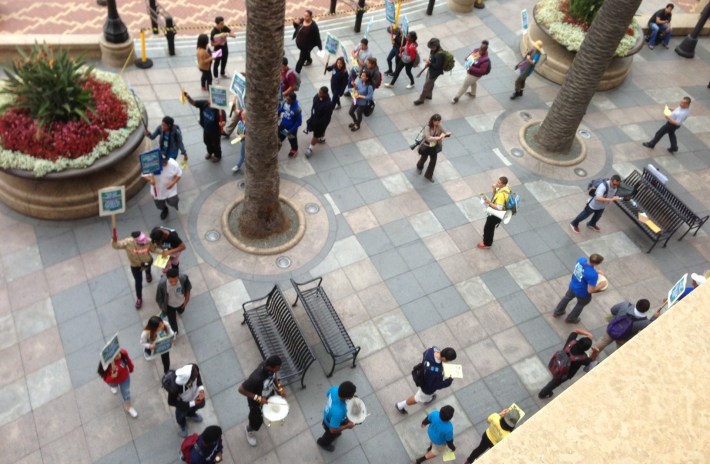
Just over four hours into its marathon monthly board meeting, the Metro Board of Directors approved its much debated fare increase. Metro's base transit fare will increase from $1.50 to $1.75 in September 2014. Weekly and monthly passes, and senior and disabled fares will also undergo similar increases. The fare increase motion passed with twelve in favor. County Supervisor Gloria Molina was the only board member voting opposed.
A few of the most painful impacts of the fare increase were mitigated by the Garcetti-Yaroslavsky-Ridley-Thomas amendment motion, which also passed in an amended form.
As has been the case during past fare increase debates, there was a long series of public speakers against increasing fares. Roughly one hundred speakers - students, seniors, parents, workers - urged the board not to balance its budget on the backs of the poor. Opposition was organized by the Bus Riders Union (BRU) and Fight For the Soul of the Cities (FFSC.) These groups made it clear that they did not support the small improvements in the amendment motion, but saw these as an attempt, in the words of BRU's Barbara Lott-Holland, to "create a wedge" splitting the opposition.
County Supervisor Molina was the lone board member to ally herself with the public opposition the fare increase. Molina proposed that the fare increase be deferred, and that Metro staff instead be tasked with finding a "one and one-half percent" cut to the operations budget. Molina's motion failed, unable to secure support from a second board member. Mayor Garcetti offered to incorporate direction to staff to report back on operations budget trimming, but that report back ultimately was not included.
Board member and Los Angeles City Councilmember Mike Bonin shepherded a number of amendments that strengthened the Garcetti-Yaroslavsky-Ridley-Thomas amendment motion. These included:
- Clarifying that student fares would remain frozen until the Metro board takes action to raise them. Bonin proposed also freezing senior fares; this was not adopted outright, but will come back for discussion at a future meeting. Metro staff reported that freezing student fares would cost the agency roughly $1.5 million annually, and senior fares, roughly $6 million annually.
- Clarifying that planned 2017 and 2020 fare increases, postponed in the motion, would also come back to the Metro board for a decision prior to implementation.
- Clarifying that base fare increases would only take place at the same time as implementation of the 90-minute 2-hour free transfer window. Though this seems implicit in Metro's fare increase proposal, there's apparently some rumor as to technical difficulties with TAP cards' ability to facilitate the new free transfer window. This reporter was unable to confirm details, but there have apparently been Metro proposals floated internally that would implement the base fare increase promptly, and follow later with the free transfer window. With Bonin's amendment, this will not be the case.
Streestblog will continue to follow and report on the fare increase implementation, and the outcomes of the Transit Ridership Best Practices Task Force formed by the amending motion.





